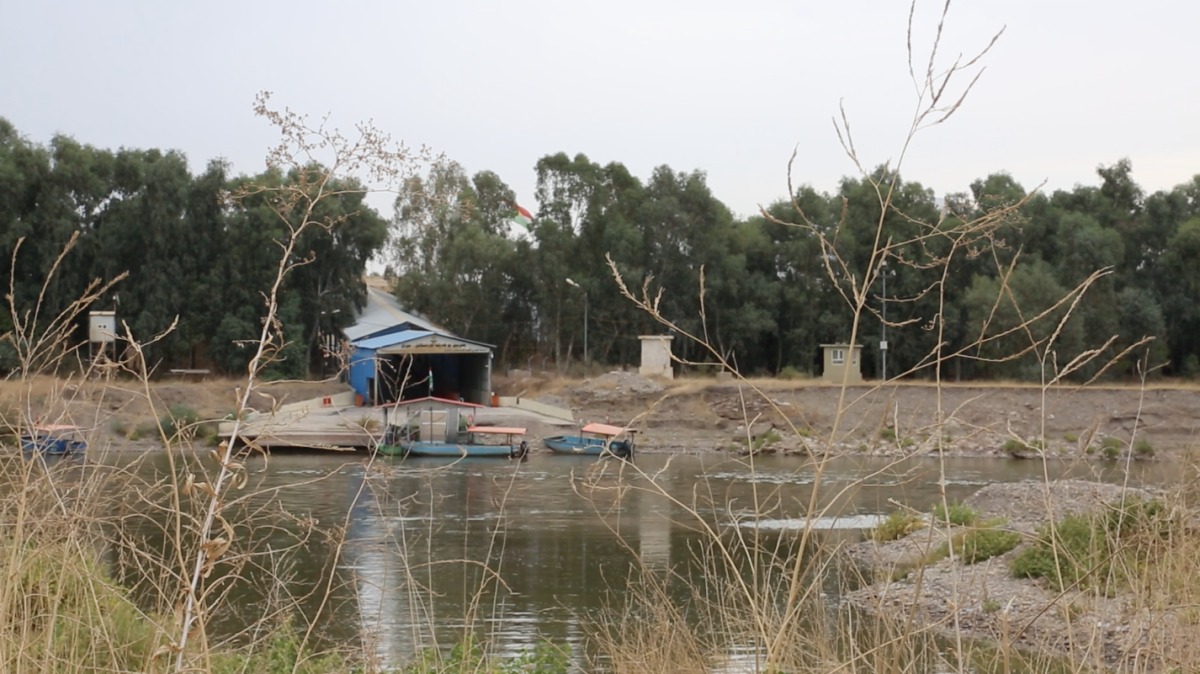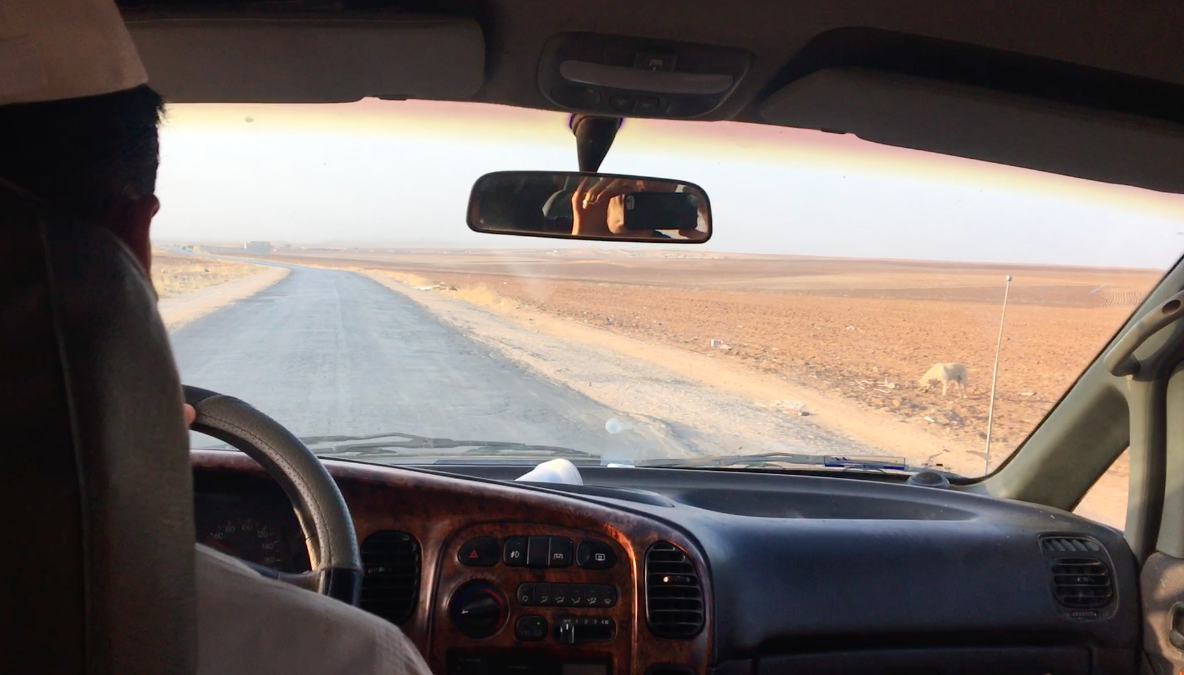We boarded a metal barge and the boatman ferried us across the current until, with a rev of the outboard, he beached on the opposite shore. The border post on the Syrian side of the river was a hut where a crowd waited to leave, and I swallowed the feeling I was going the wrong way.

The interpreter I had arranged was waiting with his van and I put my gear in the back beside a plastic gas can and an army green box that read: 12 pcs 60mm M73 HE mortar shell.
“Don’t worry,” he said.
I noticed he walked with a limp and when I asked about it he said he was shot during fighting in his hometown, Kobane.
Up the road came the first sign this was guerrilla country — a billboard of Abdullah Ocalan, the imprisoned PKK Kurdistan Workers’ Party leader. Surrounding his portrait were photos of the international volunteers killed fighting ISIS alongside the Kurds.
I recognized two of them as Canadians whose funeral processions I had attended in Ontario. I had sat in their mothers’ living rooms, feeling their loss. I’d sworn never to go to Syria because who could put their family through that?
ISIS had warned me not to come, writing to me on Twitter: “Come here and do some journalism. End up like Foley,” a reference to U.S. journalist James Foley, whom ISIS beheaded on video.
But then, in mid-September, the U.S.-backed Kurdish forces confirmed in conversations over social media they had captured a Canadian — not just any Canadian, but Muhammad Ali, a notorious ISIS member from Mississauga who went by Abu Turaab Al Kanadi.
He’d boasted online about playing soccer with severed heads and called for terrorist attacks in Canada. The day after ISIS released the video of Foley’s execution, Ali wrote on Twitter that he wondered how I felt after watching it. He ended with a keyboard wink, ;).
Given his long absence from social media, I’d assumed Ali was buried beneath a rubble pile somewhere, crushed by an air strike. But the Kurds insisted they had him, and other journalists said it was alright to travel there and the interpreter I had hired as a guide, or “fixer,” didn’t seem overly concerned.
“Don’t worry,” he assured me.
So I flew to Vienna and on to Erbil in northern Iraq accompanied by Amarnath Amarasingam, a knowledgeable and amiable professor who studies foreign fighters and was also keen to meet Ali.
It didn’t take long to realize that what looked on the map like a day of driving would take much longer. Getting there required a seemingly endless pile of “permissions.” Permission to pass through checkpoints; permission to leave Iraqi Kurdistan; permission to enter Syria. And permission to get inside a Kurdish prison.

After checking in at an administrative building on the Syrian side of the border, and adding another slip of officially-stamped paper to our collection, we headed out into the emptiness. Dust and oil wells, men and women in camouflage driving white Toyota Helux pickups.
The landscape was a flag consisting of two horizontal stripes, tan below, blue above. Land and sky. Death and eternity. It was enough to make anyone crazy. It made you imagine things: something better, a perfect world beyond this. You only had to believe it, but belief could so easily become obsession.
A roadside building our fixer said had been destroyed by a Turkish airstrike was a reminder of the complexity of the region, and that the fight against ISIS was just one of its overlapping armed conflicts, another being the Kurdish independence struggle against Turkey.
We stopped to meet the police commander and then came into Qamlishi, a city close to the Turkish border. The buildings were low and the traffic circles were adorned with posters of the martyrs of the Peoples’ Protection Units, the local Kurdish armed group known as the YPG.
It was a divided city. The regime forces still controlled a third of it, notably the border and airport. Their barricades were marked with Syrian flags and posters of President Bashar al-Assad, the tyrant with the oversized forehead, aviator sunglasses and strangely oppressive moustache.
To them, this was the Syrian Arab Republic. To the YPG, it was Rojava, the Syrian Kurdish homeland. And to ISIS, it was part of the mythical Islamic State. But the fighting was hours south of us and I heard no gunfire in the city, the sides seemingly resigned to stalemate, for now.
The hotel lobby was full of chainsmokers, cooled by a rotating fan and lit with pink, red and blue fluorescent lights, which drove me to the rooftop overlooking the market. That evening our fixer found us. He had got a call. In the morning, we were to go to a place called Roj Camp, where ISIS wives and their children were being held.
The city was pleasantly deserted in the morning, it being Friday, the holiday. The camp looked like an everyday refugee camp from the road, but when we went inside the gate it was clear there was more security. The commander didn’t seem to want to let us in, so we waited. We drank tea. The commander told us about his son, who was engaged to a woman from Toronto named Julia. He tried to show us her photo, but the wi-fi was down.
An hour later, we were taken to a spacious visiting room with comfortable chairs and a sofa, where we met the camp manager. And then in came a woman from Montreal, who talked about why she came to Syria and how badly she now wanted to get out with her two kids. She was followed by a Toronto woman, a mother of three, with a similar story, although she insisted her husband tricked her into traveling to Syria. She cried and I instinctively said sorry. To an ISIS wife.
Two days later, the fixer found me at the hotel. He had got another call, giving him an address. We were to be there at 8 a.m. We weren’t told why but it sounded encouraging, although I was still skeptical they would let us talk to Ali. We thought they might bring us someone else instead, maybe an Algerian-Canadian from Montreal we had heard about.
“Don’t worry,” the fixer assured us.

The address turned out to be an old regime building. The sign above the entrance said it was the Department of Immigration and Passports but it loomed like a prison. I opened the trunk and my tripod was in pieces from all the bouncing over rough roads. I reassembled it as best I could with pliers and we were taken to an office decorated with YPG flags.
They seemed to be expecting us. It was the first place where we didn’t have to explain ourselves, where we weren’t told our request was impossible and then, over tea, were expected to win over those in charge.
I recognized Ali as soon as he came through the door. He sat on the couch and asked about his wife, an Afghan-Canadian from Vancouver who had also been captured, along with their child. Ali said it was his birthday. He was 28. The power went out.
I wasn’t sure how long we would have. I was warned it might only be 15 minutes but we spent close to two hours together, talking about his relationship with his parents, joining ISIS, his disenchantment with ISIS, his capture, his interrogations, his prison routine and his wish to return to Canada.
He said he remembered us, so it was a sort of reunion, the kind that happens when you finally meet someone you have only known online. The image Ali had projected on social media was menacing, threatening and violent. He was Abu Turaab, literally Father of Dust. He wanted to be feared.
But the man sitting across from me wasn’t frightening at all. He looked physically soft. His head was shaved but he seemed to be balding. Dark circles ringed his eyes. He kept scratching his legs. He said he was ill. He was defeated. He was ISIS.
And now he was the one with reason to be afraid.

We crossed back into Iraq the next morning. The professor headed to Sinjar and I took a cab to Erbil with a driver who spoke no English so that our conversation consisted of him saying “Canada!” and giving a thumbs up and I replied with “Kurdistan!” and an enthusiastically raised thumb.
On the way to the airport, I remembered something the Toronto woman had told us at the camp, that we would be going back to Canada soon and she would have to stay there with her three children and winter coming, and she was right and I was glad to be getting out of there.










Comments